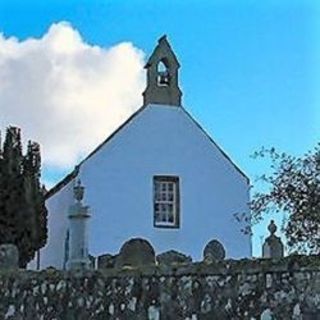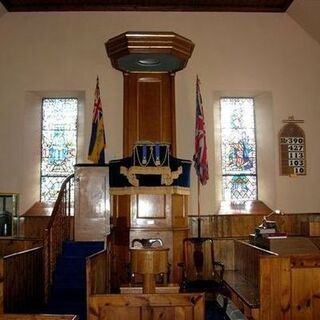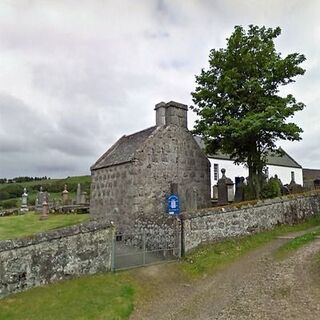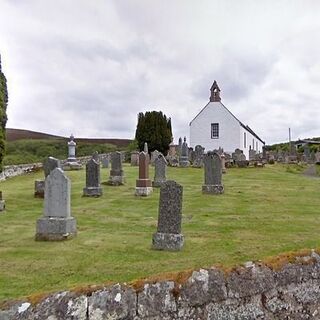We found 9 more Church of Scotland churches near Sutherland
Who we are
St. Callan's Church in Sutherland, Highland is a Christian congregation serving the Sutherland community and seeking, engaging, and encouraging others through a life-changing Christian journey.
We seek to be a loving, friendly community that worships God, and serves others. We place a high priority on teaching from the Bible and following the example of Jesus.
Our vision is to impact and renew Sutherland and beyond with the transforming message of Jesus Christ through words and actions.
Come as you are - we'd love to get to know you.
We seek to be a loving, friendly community that worships God, and serves others. We place a high priority on teaching from the Bible and following the example of Jesus.
Our vision is to impact and renew Sutherland and beyond with the transforming message of Jesus Christ through words and actions.
Come as you are - we'd love to get to know you.
Church Address
Church Pastor

Rev S J Chambers
Minister
Bannlagan Lodge
4 Earls Cross Gardens
Dornoch, Sutherland,
Highland
IV 25 3NR
4 Earls Cross Gardens
United Kingdom
Phone: 01862 811520
Download Minister Rev S J Chambers vCard
Click here to contact Rev S J Chambers
Denomination
Church of Scotland
Church of Scotland churches in Sutherland, Highland
Church of Scotland churches in Highland
Church of Scotland churches in United Kingdom
Church of Scotland churches near me
All churches in Sutherland, Highland

Affiliations
Church Website
St. Callan's Church on Social Media
Leadership
Leader Name:
Rev S J Chambers
Leader Position:
Minister
Formal Title:
Leader Address:
Bannlagan Lodge
4 Earls Cross Gardens
Dornoch, Sutherland
Highland
IV 25 3NR
4 Earls Cross Gardens
Dornoch, Sutherland
Highland
IV 25 3NR
Phone:
Fax:
Leader Email:
Click here to contact Rev S J Chambers
Leader Bio:
Rev S J Chambers on Social Media:
Other Church Leaders:
Leadership Photos
Add a Photo
Administration
Admin Name:
Admin Position:
Admin Address:
Phone:
Fax:
Admin Email:
Mailing Address
Driving Directions
Travel/Direction Tips
Know how to get there? Share the knowledge with others!
Parking
Please share parking information and/or parking experience!
St. Callan's Church Service Times
This church page is missing service times. Please click here to help this page visitors by submitting the church service times. Thank you!
Worship Languages
Dress Code
Sunday School / Children and Youth Activities
Under 12s:
Under 18s:
Local outreach & community activities
Other activities & ministries
Special Needs/Accessibility
Prayers and Hymns
Main Bible:
Hymns and Songs:
Other information
Average Adult Congregation:
Average Youth Congregation:
Additional Info:
St. Callan's Church Sutherland Photos
St. Callan's Church History
A History of the Church in Rogart, Sutherland
By The Rev J. L Goskirk
The Christian Gospel was first preached in what was to become the parish of Rogart Foundation of the Church in the 7th Century. During that period missionaries from those areas of Scotland in which the Faith was already established- and also from Ireland - reached the district. One of these was Callan (Latin - Culalinus) who appears to have made Strathfleet and the area stretching up towards Strathbrora the sphere of his work. The site of a Chapel of St Callan lies on the bank of the River Fleet near Kinnauld and there was also a chapel at Rovie with a burial ground which remained in use for many centuries.
The parish of Rogart takes its name from the place where the present St Callan's church is situated. In earlier days this was often referred to as Rogartmore or Big rogart (also Muckle rogart) and. of course, the town ship of Little rogart lies opposite. The meaning of the name may now be impossible to define and experts vary in their suggestions. In the First Statistical Account, 1780, it was stated that the original name was Roghard, meaning in Gaelic "very high". The Second Statistical Acccount, 1835 suggested Rhidheard - from two Gaelic words - Rhide - an inclined plain, and Ard - high.. The author of 'Sutherland and the Reay Country' says "early characters give Rothgorthe, known in highland topography- Rothe, a circle, and Gorthe, a cultivated land". when we stand at St. Callan's Church and face west we are certainly looking down on a rough circle of land bounded by the hills behind us and those beyond Little Rogart and Rheidchalmie. It seems a very reasonable description of the vicinity - the low lying area of marshy ground with the hills encircling it on all sides, but any of the theories would fit.
Foundation of the Church
Here it would seem, Callan, or his successors, built a church which eventually became the principal place of worship for the district. The now obsolete place-name Balintemple or Templetown (Gaelic - Baile-an-Teampull) for a township which was in close proximity to the Church confirms that this is a very old religious site. The Gaelic word 'Teampull' was used for church buildings in the time of Callan and before.
The church was by no means centrally situated in the parish, being for centuries even nearer the boundary between Rogart and Dornoch than it is today, for Kinnauld was, until comparitively recently, in the latter parish. According to an ancient legend the site was chosen by somewhat unorthodox means. Two white horses, each drawing sledges, one bearing a heavy stone and the other a Bible, were set loose from a given point. The course covered by the first horse marked the boundaries of the glebe, while the place where the second horse halted was where the Church was erected.
However, the choice was made, the fact that it is easily accessible from every part of the parish with roads leading in from Langwell, Morness, Rhilochan, the western end of Strath Fleet by way of Pitfure and Little Rogart, and from Pittentrail. Indeed it is noteworthy that the Church is actually visible from Milton Muie - about five miles away as the crow flies. Originally, and for many generations the church would have been a simple stone building with a roof of heather thatch and only the simplest of furnishings. A common idea that Scottish mediaeval parish kirks were miniature reproductions of the Cathedral and monastic ones is completely at variance with fact. As George Hay states in 'The Architecture of Scottish Post-Reformation Churches', "From the 13th Century onward the most common type of church plan was a simple aisleless rectangle often of rather attenuated proportions."
Over the years repairs and alterations must have been required but there is no record of any of these. The Highlands were primitive and unsettled places in the mediaeval period. What records do survive relate to the Cathedrals and Monasteries and not to the humble parish churches. We know however that in the diocese of Caithness, fourteen of the parish churches were assigned for the maintenance of the Canons. One of these was the chancellor to whom was given the Church of Rogart.
The Reformation In Scotland 1560 The Reformation came slowly to the Highlands and without, it seems, very much of the upheaval experienced in the South of Scotland and other countries. In many cases apparently the parish priests simply threw in their lot with the Reformed Church and continued to serve their people. Some became ministers, others, perhaps lacking the standard of education required by the kirk - the low standard of education of the clergy in the pre-Reformation Church was notorious - became Readers, who as the name implies, read the service from the Book of Common Order and often, in the absence of the minister qualified to preach, read to the congregation from a book of homilies.
It is virtually certain then that St.Callans continued in use, being altered only to suit it as a place of Protestant, rather than Roman Catholic, worship. But again it must simply be said that we have no record of any of these alterations or of any repairs or improvements until the first decades of the 18th Century. By then the Kirk of Rogart, as it was now known, was in a very bad state of repair - a condition it shared with almost every other parish church in the county. It was the responsibility of the Heritors - the landowners of the parish - to provide and maintain churches and manses, but this they were often unwilling to do.
By this period however, the Presbyterian system was firmly established and the Presbytery (of Dornoch) began to make itself heard in the matter.
In 1736, the minister of Rogart, the Rev John Munro, reported to the Presbytery that despite an official visitation which had taken place some years before, the Heritors had done nothing.
From: http://www.caithness.org/atoz/sutherland/stcallans/index.htm
By The Rev J. L Goskirk
The Christian Gospel was first preached in what was to become the parish of Rogart Foundation of the Church in the 7th Century. During that period missionaries from those areas of Scotland in which the Faith was already established- and also from Ireland - reached the district. One of these was Callan (Latin - Culalinus) who appears to have made Strathfleet and the area stretching up towards Strathbrora the sphere of his work. The site of a Chapel of St Callan lies on the bank of the River Fleet near Kinnauld and there was also a chapel at Rovie with a burial ground which remained in use for many centuries.
The parish of Rogart takes its name from the place where the present St Callan's church is situated. In earlier days this was often referred to as Rogartmore or Big rogart (also Muckle rogart) and. of course, the town ship of Little rogart lies opposite. The meaning of the name may now be impossible to define and experts vary in their suggestions. In the First Statistical Account, 1780, it was stated that the original name was Roghard, meaning in Gaelic "very high". The Second Statistical Acccount, 1835 suggested Rhidheard - from two Gaelic words - Rhide - an inclined plain, and Ard - high.. The author of 'Sutherland and the Reay Country' says "early characters give Rothgorthe, known in highland topography- Rothe, a circle, and Gorthe, a cultivated land". when we stand at St. Callan's Church and face west we are certainly looking down on a rough circle of land bounded by the hills behind us and those beyond Little Rogart and Rheidchalmie. It seems a very reasonable description of the vicinity - the low lying area of marshy ground with the hills encircling it on all sides, but any of the theories would fit.
The church was by no means centrally situated in the parish, being for centuries even nearer the boundary between Rogart and Dornoch than it is today, for Kinnauld was, until comparitively recently, in the latter parish. According to an ancient legend the site was chosen by somewhat unorthodox means. Two white horses, each drawing sledges, one bearing a heavy stone and the other a Bible, were set loose from a given point. The course covered by the first horse marked the boundaries of the glebe, while the place where the second horse halted was where the Church was erected.
However, the choice was made, the fact that it is easily accessible from every part of the parish with roads leading in from Langwell, Morness, Rhilochan, the western end of Strath Fleet by way of Pitfure and Little Rogart, and from Pittentrail. Indeed it is noteworthy that the Church is actually visible from Milton Muie - about five miles away as the crow flies. Originally, and for many generations the church would have been a simple stone building with a roof of heather thatch and only the simplest of furnishings. A common idea that Scottish mediaeval parish kirks were miniature reproductions of the Cathedral and monastic ones is completely at variance with fact. As George Hay states in 'The Architecture of Scottish Post-Reformation Churches', "From the 13th Century onward the most common type of church plan was a simple aisleless rectangle often of rather attenuated proportions."
The Reformation In Scotland 1560 The Reformation came slowly to the Highlands and without, it seems, very much of the upheaval experienced in the South of Scotland and other countries. In many cases apparently the parish priests simply threw in their lot with the Reformed Church and continued to serve their people. Some became ministers, others, perhaps lacking the standard of education required by the kirk - the low standard of education of the clergy in the pre-Reformation Church was notorious - became Readers, who as the name implies, read the service from the Book of Common Order and often, in the absence of the minister qualified to preach, read to the congregation from a book of homilies.
By this period however, the Presbyterian system was firmly established and the Presbytery (of Dornoch) began to make itself heard in the matter.
In 1736, the minister of Rogart, the Rev John Munro, reported to the Presbytery that despite an official visitation which had taken place some years before, the Heritors had done nothing.
From: http://www.caithness.org/atoz/sutherland/stcallans/index.htm
St. Callan's Church Historical Photos
Add a historical photo
St. Callan's Church listing was last updated on the 15th of February, 2018
THANK YOU FOR VISITING ST. CALLAN'S CHURCH ONLINE!
St. Callan's Church Accelerated Mobile Page (AMP)














